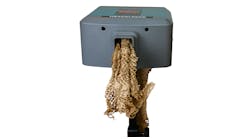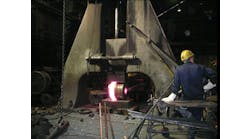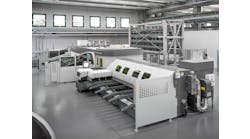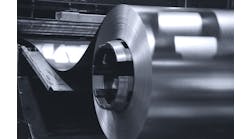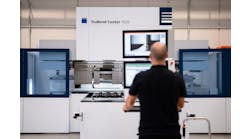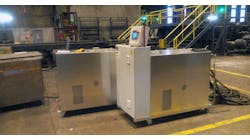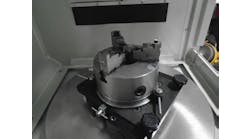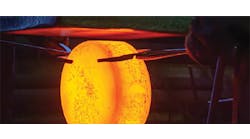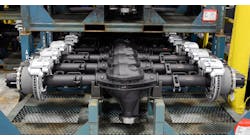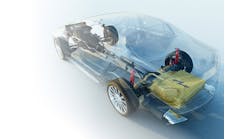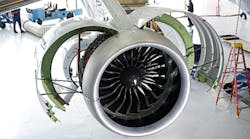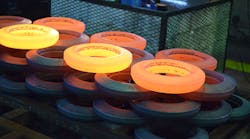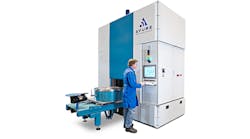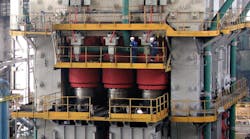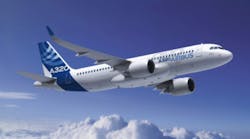Alcoa has secured a 10-year, $1.1-billion supply agreement with Pratt & Whitney concerning critical components for the PurePower geared turbofan jet engines. The new deal underscores Alcoa’s recent efforts to emphasize its capabilities as a supplier of high-value aerospace materials and products — including buying Firth Rixson Ltd. — and recalls a similar long-term deal that Alcoa struck with Airbus SAS to supply titanium and aluminum aerospace forgings.
Pratt & Whitney is a United Technologies subsidiary. Its deal with Alcoa was completed at the ongoing Farnborough Air Show in England, the global aerospace trade expo.
Alcoa noted that the new supply deal will see it produce and supply for the world’s first aluminum fan blade for jet engines. It’s a forging design that was developed for Pratt & Whitney’s PurePower engines using an advanced aluminum alloy and a proprietary manufacturing process.
In addition, Alcoa announced it is developing a fan blade forging for the PurePower engines using an advanced aluminum-lithium alloy.
“We’re going where no materials scientist has gone before,” according to Alcoa chairman and CEO Klaus Kleinfeld. “Combining Alcoa’s proprietary alloys and unique manufacturing processes with Pratt & Whitney’s design, we cracked the code on forging an aluminum fan blade that is lighter and enables better fuel efficiency.
Kleinfeld noted that in addition to the fan blade forgings Alcoa will deliver products in other forms, including blades and vanes to structural castings, for some of Pratt and Whitney’s best-selling engines.”
Aluminum and aluminum-lithium alloys from Alcoa plants in Pittsburgh and Lafayette, IN, will be used to form the front fan blades, using proprietary forging processes at Alcoa’s Cleveland plant. Other Alcoa plants including La Porte, Ind.; Whitehall, Mich.; Dover, NJ; and Wichita Falls, TX will supply blades, vanes, and structural components in nickel-based superalloys, titanium, and aluminum.
In recent weeks, Alcoa has announced expansion programs totaling more than $125 million for two investment casting operations, specifically to produce engine and structural castings for commercial aerospace programs.
Separate Fan, Compressor, Turbine
The PurePower PW1000G jet engine is a geared turbofan design, with a gear system that separates the engine’s fan from the low-pressure compressor and turbine: As such, each module can operate at optimal speed. This makes it possible for the designers to increase the diameter of the fan and the low-pressure compressor and turbine to operate at a high speed.
Also, the larger fan diameter makes it possible to select materials other than the usual titanium and composites. The engine fan blades are produced in aluminum alloys, for weight and fuel savings.
“The PurePower engine’s hybrid metallic fan blade represents a significant advance in our engine design and allows us to meet engine performance requirements while reducing weight and cost,” stated Paul Adams, president of Pratt & Whitney.
The advanced gear system allows the fan to rotate at a slower speed and the hot section to operate at higher speeds, optimizing the running conditions of both. The large, lightweight fan moves more than 90% of the air around the core, so the engine is quiet and maintains very low fuel burn.
In all, the design results in an engine with fewer stages and parts, and thus lower weight and reduced maintenance costs. The result is significant reductions in fuel burn, environmental emissions, engine noise, and operating costs.
Pratt & Whitney supplies PurePower engines to several aircraft OEMs, including Airbus for its Airbus A320neo, a narrow-body commercial aircraft to be introduced next year.
Alcoa will supply parts for the PurePower PW1000G, V2500, and GP7000 and several other regional jet and military engines.
“We worked in lock step with Pratt & Whitney during their development of the engine, providing technical solutions that previously did not exist,” according Eric Roegner, chief operating officer for Alcoa Investment Castings, Forgings, and Extrusions.
